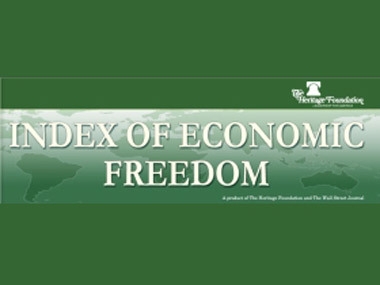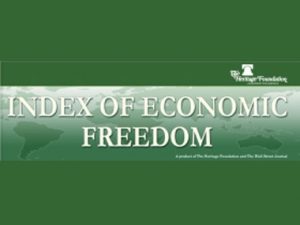India has slipped by 10 positions to 112th, as it “fared badly” across categories including legal system and regulation, according to the Economic Freedom of the World: 2016 Annual Report.
Economic Freedom Index:-
Economic freedom is the fundamental right of every human to control his or her own labor and property. In an economically free society, individuals are free to work, produce, consume, and invest in any way they please.
- In economically free societies, governments allow labor, capital, and goods to move freely, and refrain from coercion or constraint of liberty beyond the extent necessary to protect and maintain liberty itself.
- The Index of Economic Freedom is an annual index and ranking created by The Heritage Foundation and The Wall Street Journal in 1995 to measure the degree of economic freedom in the world’s nations.

- The creators of the index took an approach similar to Adam Smith’s in The Wealth of Nations, that basic institutions that protect the liberty of individuals to pursue their own economic interests result in greater prosperity for the larger society
Index – 2016:-
India has fared badly in all categories i.e. legal system and property rights (86), sound money (130), freedom to trade internationally (144) and regulation (132) except the size of the government (8).
- The index has become more comprehensive and the available data more complete. As a result, the number and composition of the components for many countries varies across time.
- This presents a problem similar to that confronted when calculating GDP or a price index over time when we know that the underlying bundle of goods and services is changing from one year to another.
- In order to correct for this problem and assure comparability across time, we have done the same thing that statisticians analyzing national income do: we have chain linked the data.
- Construction of the index published in Economic Freedom of the World is based on three important methodological principles.
- First, objective components are always preferred to those that involve surveys or value judgments. Given the multidimensional nature of economic freedom and the importance of legal and regulatory elements, it is sometimes necessary to use data based on surveys, expert panels, and generic case studies.
- Hong Kong and Singapore, once again, occupy the top two positions. Next comes New Zealand and Switzerland, two countries almost always in the top five.
- Five countries—Canada, Georgia, Ireland, Mauritius, and United Arab Emirates— are tied for fifth place. Australia and United Kingdom conclude the top ten with a tie.
- The rankings of some other major countries are the United States (16th), Germany (30th), Japan (tied for 40th), South Korea (tied for 42nd), France (tied for 57th), Italy (69th), Mexico (tied for 88th), Russia (tied for 102nd), India (112th), China (tied for 113th), and Brazil (124th).
- The 10 lowest-rated countries are: Iran, Algeria, Chad, Guinea, Angola, Central African Republic, Argentina, Republic of Congo, Libya, and lastly Venezuela
AffairsCloud Recommends Oliveboard Mock Test
AffairsCloud Ebook - Support Us to Grow
Govt Jobs by Category
Bank Jobs Notification






